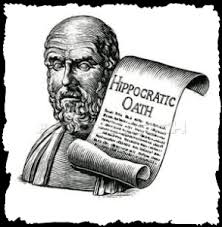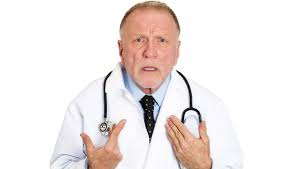 Doctors are taught from year 1 Medicine (if not before): First, do no harm. And yet, in treating addicted individuals, doctors often do more harm than good — by obstructing or totally derailing the recovery process. That should never happen! I want to show you what I mean by telling you part 2 of Sally’s story — the first part of which appeared a few posts ago.
Doctors are taught from year 1 Medicine (if not before): First, do no harm. And yet, in treating addicted individuals, doctors often do more harm than good — by obstructing or totally derailing the recovery process. That should never happen! I want to show you what I mean by telling you part 2 of Sally’s story — the first part of which appeared a few posts ago.
That post was about the value of pharmaceutical opioids for supervised “maintenance” or tapered withdrawal, and about my failure to use a publishing opportunity to educate doctors. In contrast, this post is about quitting, “getting clean” as people still say, without any supervision. Because you can and you want to. A lot of people quit that way.
And yet, incredibly, doctors often advise against it!
Sally (a resident of the UK) wasn’t taken care of properly in her teenage years, became a heroin addict in her mid-teens, became a prostitute soon after, endured physical and sexual violence, including rape, and finally dragged herself off the street by sheer force of will. At that point her soul was flattened. She had little fight left in her. Just enough. She was cared for by a friend for several months; she slept on a spare sofa. She was afraid of noises, afraid of silence, afraid of the night…because the man who had raped her was still out there. Until he killed himself. Good riddance.
Sally struck out on her own, found a stable relationship with a man, had a couple of kids, found a better relationship, had another kid. Life started to settle down — a much as it can with three young kids at home. Now her days are spent soothing, caring, teaching…giving her kids a lot of what she didn’t get enough of. A couple of nights a week she works with elderly people who need help. And if there are hours to spare, house-cleaning and all the rest of it. She and her partner are making it work.
When Sally got in touch with me to start psychotherapy, she was taking eight 30-mg tabs of codeine a day, prescribed by her doc, plus 10-20 tablets of codeine (12.5-mg) mixed with paracetamol (acetaminophen) which she got over the counter. Having survived Hep-C (with successful treatment) it was a wonder her liver hadn’t given up the ghost. But no, she was very much alive: vivacious, generous, funny, smart and pretty. She had made it to 40 and had every intention of staying alive.
I don’t tell my clients they have to stop taking drugs, but if they want to quit, if they want to cut down, let’s see what we can do. Sally wanted to quit. Although the codeine relaxed her and gave her the energy she felt she needed to keep house, images of opiates could hardly be kept apart from images of  life on the street. And she tended to obsess about her next dose for too much of her day. She wanted to have done with it. Yet, withdrawing from heroin had been so grueling — it still terrified her. So the solution was obviously to taper gradually.
life on the street. And she tended to obsess about her next dose for too much of her day. She wanted to have done with it. Yet, withdrawing from heroin had been so grueling — it still terrified her. So the solution was obviously to taper gradually.
We talked about tapering in our sessions. I wanted her to reduce her paracetamol intake first, since it put her at great risk. But the rest…we can go slow, I said. With that message from me, she took matters into her own hands. From one week to the next her daily dose went down and down. She was proud and excited about her “detox” (as she put it). She was down to nearly half the amount of codeine she’d been on for years. She was the one  pressing me: let’s go down another two tablets this week. I don’t think I need my second morning dose. She started to skip doses…and that meant she had a reservoir of spares, just in case. She was tailoring it, shaping it, doing it. She was the boss.
pressing me: let’s go down another two tablets this week. I don’t think I need my second morning dose. She started to skip doses…and that meant she had a reservoir of spares, just in case. She was tailoring it, shaping it, doing it. She was the boss.
Until she was assigned a new doctor. Much younger, armed with the latest policies and trends. He knew enough about addiction to help her, and she needed help, he insisted. No, he would not prescribe Valium to carry her  through the very end of her taper and possible withdrawal symptoms — not even 15 or 20 tabs. Valium is very addictive, you know. But that was okay: they’d taper together. She’d come to the office every week — not an easy trek for a mother of three small kids, but it was important for him to see her, to monitor her. And she would reduce her intake by one tablet — 30 mg — at a time, he insisted. But she had to agree that every time she reduced her dose, she’d have to maintain the new level. She couldn’t go back up. Not even for a particularly bad day. He knew what was best for her. Did she agree? Did she have a choice? If she didn’t agree he’d stop her prescription, and then she’d be in danger of paracetamol poisoning again, unless she went back to heroin.
through the very end of her taper and possible withdrawal symptoms — not even 15 or 20 tabs. Valium is very addictive, you know. But that was okay: they’d taper together. She’d come to the office every week — not an easy trek for a mother of three small kids, but it was important for him to see her, to monitor her. And she would reduce her intake by one tablet — 30 mg — at a time, he insisted. But she had to agree that every time she reduced her dose, she’d have to maintain the new level. She couldn’t go back up. Not even for a particularly bad day. He knew what was best for her. Did she agree? Did she have a choice? If she didn’t agree he’d stop her prescription, and then she’d be in danger of paracetamol poisoning again, unless she went back to heroin.
 I saw Sally next a few days after that visit. Her energy was gone. Her smile was sad and cynical. She’d gone back up to her previous high dose, including the paracetamol torpedoes, because…because it wasn’t her recovery anymore. That’s how she put it. And it was none of his damn business and she didn’t like his rules and she didn’t like him. But the threat of a sudden withdrawal trumped all that. That was the power he wielded, and he knew it.
I saw Sally next a few days after that visit. Her energy was gone. Her smile was sad and cynical. She’d gone back up to her previous high dose, including the paracetamol torpedoes, because…because it wasn’t her recovery anymore. That’s how she put it. And it was none of his damn business and she didn’t like his rules and she didn’t like him. But the threat of a sudden withdrawal trumped all that. That was the power he wielded, and he knew it.
Sally got a script for Valium from a shady mail-order pharmacy. Valium wasn’t a risk for her. She was saving it for when and if she needed it.
But I don’t think she will need it. She got her old doctor back again, and even though he isn’t knowledgeable about addiction, he’s willing to continue the monthly prescription he’s provided for years. Now it’s Sally’s turn again. She’s tapering. At her own rate. The drawer of unused tablets is filling up again. And she’s smiling again. She figures she’ll be down to zero in another month or two. I occasionally remind her that she can take a few extra if things get particularly rough. People need to know that recovery isn’t a straight line.
Why on earth coerce or scare someone out of their addiction when they want to quit and it’s within their power to do so? Why would you take that away from someone, when it means so much to them?
My brother’s a great doctor — a GP. He’s helped a lot of people. He’s kind and generous and smart. But he doesn’t pretend to be God. And he doesn’t pretend to know his patients better than they know themselves.

Leave a Reply